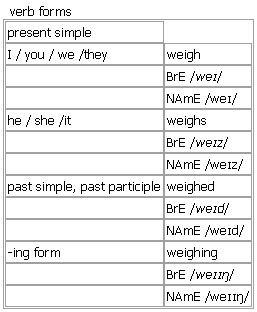|
Từ điển Oxford Advanced Learner 8th
 weigh
weigh

weigh [weigh weighs weighed weighing] BrE [weɪ] NAmE [weɪ] verb
1. linking verb (+ noun) to have a particular weight
• How much do you weigh (= how heavy are you)?
• She weighs 60 kilos.
•The average male tiger weighs around 200 kg.
•These cases weigh a ton (= are very heavy).
2. transitive ~ sb/sth/yourself to measure how heavy sb/sth is, usually by using ↑scales
• He weighed himself on the bathroom scales.
• She weighed the stone in her hand (= estimated how heavy it was by holding it).
3. transitive to consider sth carefully before making a decision
•~ sth (up) You must weigh up the pros and cons (= consider the advantages and disadvantages of sth).
• She weighed up all the evidence.
•~ (up) sth against sth I weighed the benefits of the plan against the risks involved.
4. intransitive ~ (with sb) (against sb/sth) to have an influence on sb's opinion or the result of sth
•His past record weighs heavily against him.
•The evidence weighs in her favour.
5. transitive ~ anchor to lift an ↑anchor out of the water and into a boat before sailing away
Idiom: ↑weigh your words
Derived: ↑weigh in ▪ ↑weigh on somebody ▪ ↑weigh somebody down ▪ ↑weigh somebody up ▪ ↑weigh something out
Verb forms: 
Word Origin:
Old English wegan, of Germanic origin; related to Dutch wegen ‘weigh’, German bewegen ‘move’, from an Indo-European root shared by Latin vehere ‘convey’. Early senses included ‘transport from one place to another’ and ‘raise up’.
Example Bank:
•His untidy appearance weighed against him.
•The jury weighed up the evidence carefully.
•This fact weighed heavily in her favour.
•We weighed the cost of advertising against the likely gains from increased business.
•How much do you weigh?
•She weighed the stone in her hand.
•These cases weigh a ton.
|
|
|
▼ Từ liên quan / Related words
Related search result for "weigh"
|
|
